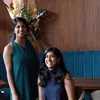How a doula and a mother started up to provide evidence-based, coherent information on pregnancy
Delhi-based entrepreneurs Tanvi Sharma and Divya Deswal aim to help women navigate through pregnancy with the right information through their startup My Child First.
Despite the number of websites and books on pregnancy, it can be a trying time for mothers-to-be if there is a lack of accurate information on problems and challenges during this time.
It was no different for Tanvi Sharma when she had her first child in 2017 – she had to change her gynecologist 36 weeks into her pregnancy as she was advised to get induced for delivery.
Working as a marketing head for the sutures business at a medical device company Medtronic India at the time, Tanvi felt overwhelmed by the information overload regarding pregnancy.
She recalls “Once my husband and I attended a childbirth class by my doula Divya Deswal and there were only two other couples apart from us. But that was the first time we felt that the information Divya shared with us needed to reach a larger audience.”
Coincidentally, Divya was planning to take a break from being a doula at the time and the duo decided to team up to start the knowledge-sharing platform My Child First in 2018. The founders’ aim was to provide easy-to-understand and evidence-based information to parents on “all aspects of child bearing and rearing.”

Divya Deswal and Tanvi Sharma, Founders of My Child First
From a mother to other mothers
Tanvi’s personal experience with motherhood made her determined to “start something to empower parents to equip themselves with information that is relevant to them and not anecdotal or based on someone’s opinion.”
As co-founder and director, Tanvi takes care of marketing and partnership related work while her husband helps with tech-related issues.
As Chief Content Officer and Director of My Child First, Divya is in charge of information and content. A civil engineer by education, Divya has over two decades of experience as a birth doula. She has taken on various roles - hypnobirthing childbirth educator, fertility practitioner, a biodynamic craniosacral therapist and pre and perinatal psychology educator and helped more than 350 women during pregnancy.
While My Child First provides information through videos and articles, the startup also operates an e-learning platform called BirthBonds where individuals and corporates can sign up for various courses. These include Anatomy and Physiology of Birth - Know Your Body, Labour land, Breastfeeding Orientation, among others. This is followed by a live Q&A session every month.
While the pre-recorded courses are priced between Rs 1,500 and Rs 3,000, the live sessions are charged Rs 8,000, which is currently priced at Rs 4500 in order to help more women during the lockdown.
The platform features more than 350 videos, shot in the last one-and-a-half years.
“We explore a variety of topics from medical doctors’ perspective to ayurvedic views on pregnancy. Our sessions are not focused on do's and don'ts because we believe there is no one-size-fits-all formula to navigate through pregnancy,” Tanvi adds.
Bootstrapped so far, the duo says their startup has reached its clients through word-of-mouth. They are currently looking to raise funds from like-minded individuals and organisations.
Pregnancy during the lockdown
The nationwide lockdown has been difficult for pregnant women and their families. A feeling of isolation due to lack of human connection and reduced doctor visits have been a major concern for expecting mothers. This has made the entrepreneurs more committed to dispersing the right information and help mums-to-be.
In response, the startup produced an interactive series called ‘Connection and Co-regulation’, which saw consistent and high engagement. “We heard their concerns and followed it up with more interactions with pediatricians, doulas, lactation consultants and midwives,” Divya adds.
Their first webinar, “Supporting pregnant women in Covid-19” saw over 200 registrants. More than 800 pregnant women have tuned in to their last eight webinar sessions.
Steady through challenges
Tanvi is clear that they wanted to collaborate with like-minded partners and hence, turning down big brands who didn’t comply with WHO guidelines was a challenge.
Personally, it has also been an arduous journey for her. She started up when her son was just a year old and gave birth to her second child in August 2019 while building My Child First.
As an entrepreneur, there was no maternity leave and she got back to work within a week of having her second son.
“There were moments when I was torn between being an entrepreneur and a mother. Both of them are not 9 am to 6 pm jobs and faced a lot of pressure with a toddler and a newborn while trying to grow our business,” she adds.
However, Tanvi multi-tasked by staying ‘super organised’ with flexible working hours – divided between working during the day and a few hours after the children were put to bed.
Unfortunately, when the duo was planning to go live with platform during Tanvi’s second pregnancy, her father was diagnosed with stage IV gallbladder cancer.
“It was ironic that when I had a new life growing inside me and in the form of my business as well, I was losing the most precious and important person in my life. I lost my father within two months of his diagnosis. It was emotionally draining,” she recalls, adding that her co-founder Divya, along with here in-laws have been strong pillars of support.
Tanvi urges women who are entrepreneurs and new mothers not to hesitate to ask for help, when needed.
The entrepreneurs claim that they value the experience of guiding mothers rather than focussing only on imparting the courses as a product. In the future, they hope to scale globally and address the needs of families and women around the world.
Edited by Rekha Balakrishnan









